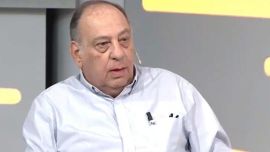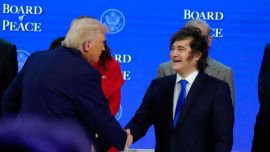On Friday, Nicolás Maduro is set to be sworn in for a third six-year term despite multiple countries recognising opposition rival Edmundo González Urrutia as the legitimate president-elect following elections in July 2024.
The Venezuelan leader has faced turbulent times since taking office in 2013 and has clung to power despite two successive re-elections widely rejected as neither free nor fair.
Economic decline
Handpicked by socialist leader Hugo Chávez to succeed him on his death from cancer, Maduro wins an election in April 2013 with just over 50 percent of the vote.
At the beginning of the following year, protests to demand he step down leave 43 dead by May.
At about the same time, the international price of oil begins to plummet, opening a dark chapter of recession, hyperinflation and shortages of critical goods in the once-rich Caribbean nation.
Today, the UN says more than seven million Venezuelans – nearly a quarter of the population – have emigrated due to economic hardship and political repression.
In the first seven years of Maduro's rule, the economy contracts by 80 percent.
New vote
In 2015, Venezuela’s opposition wins a majority of seats in the National Assembly.
But the Supreme Court, loyal to the regime, voids all parliamentary decisions.
In 2016, Maduro-friendly judges thwart an opposition bid for a referendum to revoke Maduro's presidency.
Another round of protests leaves 125 people dead in 2017.
Second term
The opposition refuses to participate in presidential elections in 2018 that Maduro claims to win with more than two-thirds of votes cast.
His victory is widely rejected as invalid, and the United States and European Union impose sanctions.
Maduro is nevertheless sworn in for a second term in January 2019.
Tens of thousands of Venezuelans protest, and days after the inauguration, opposition leader Juan Guaidó declares himself acting president.
Dozens of countries recognise Guaidó as the country's rightful interim leader, but the Army remains loyal to Maduro.
The United States blocks oil imports from Venezuela, the country with the largest proven reserves.
Failed revolt
On April 30, 2019, Guaido releases a video of himself online with a small group of soldiers, claiming to have military support.
Maduro denounces an "attempted military coup" and the following month, Caracas claims to have foiled a sea-borne incursion by an armed group.
The United States denies involvement but two US ex-soldiers are arrested and sentenced to 20 years in prison.
The country's oil production falls to its lowest level since 1943.
Taking back of parliament
In December 2020, Maduro regains control of parliament in elections again boycotted by opposition parties and rejected by the international community. His administration passes increasingly oppressive laws.
In mid-2021, Maduro's government and the Guaidó-led opposition hold talks in Mexico about organising free and fair elections and getting sanctions eased.
Maduro walks away from the talks after a businessman accused of laundering money for his regime is extradited to the United States from the West African nation of Cape Verde.
Guaidó's parallel government eventually collapses by itself, with Maduro even more firmly in control.
Brief détente
In March 2022, shortly after Russia invaded Ukraine, a US delegation visits Venezuela to discuss easing sanctions in the context of rising global fuel prices. Caracas later releases two detained US citizens.
Maduro receives a visit from Colombia's new leftist president Gustavo Petro and is addressed as "president" by France's Emmanuel Macron, who had previously described his reelection as "illegitimate."
But the rapprochement is short lived.
US sanctions are partly reimposed after wildly popular opposition leader María Corina Machado is barred from the 2024 presidential race by institutions loyal to Maduro.
Others, too, are excluded as candidates, and little-known former diplomat Edmundo González Urrutia takes Machado's place at the last minute. He stands against Maduro in elections held on July 28, 2024.
The opposition says its own tally of polling station results show González Urrutia won by a wide margin.
Electoral officials hand victory to Maduro without releasing the vote count.























Comments